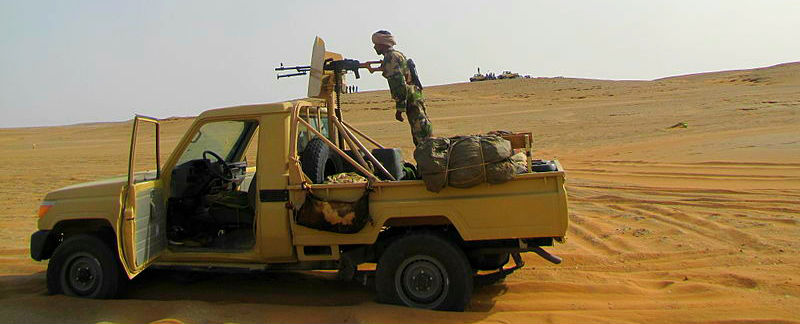
Dr. Noureddine Jebnoun, an Africa Center faculty member who focuses on governance and security in North Africa and the Sahel, authored an article titled “Changing Security Dynamics in North Africa and Western Sahel,” recently published in the Portuguese Journal of International Affairs, No. 8 (Spring/Summer 2014).
In the article, Dr. Jebnoun provides an overview of the volatile security situation in the Sahel region, and talks about what this situation in the region implies for U.S. foreign policy.
Factors contributing to the unsettled security situation in the region include: organized crime, illegal immigration, and transnational illegal activities, as well as food insecurity and malnutrition. At the same time, the region is prone to alliances and regional connections that can undermine the modern state-building process.
“For many indigenous people,” Dr. Jebnoun wrote, “systems such as tribalism, customary practices, and linguistic affiliations transcend international boundaries and, in many cases, their ethnic diversity and religious identity prevails at the expense of existing colonial borders.”
Moreover, Dr. Jebnoun points out that the inability of central governments to deliver basic services to the inhabitants of the Sahel, as well as the lack of meaningful development projects, have paved the way for violent non-state actors such as al Qaeda in the Islamic Maghreb (AQIM) and its affiliates. These groups have settled in the Sahel and forged alliances with local tribes to bolster their illegal activities rather than pursue a political/ideological agenda. The criminal economy also benefits members of the ruling government, as was the case for “northern elites” in the government of Mali’s former president, Ahmadou Toumani Touré, ultimately leading to the coup d’état of March 2012. The change of power hastened the fall of northern Mali into the hands of militant groups until a French intervention stopped their march toward Bamako and pushed them out of major urban centers.
However, according to Dr. Jebnoun, AQIM and its affiliates have updated their tactics, showing their flexibility and adaptability. For example, while the French operation in northern Mali in early 2013 mitigated the grip of AQIM and its affiliates, Islamist insurgent groups sought to outsource their operations to neighboring countries, including Niger—where a military base in Agadez and the French-managed Uranium site of Arlit came under suicide-bomb attack in May 2013—and Algeria—where the oil complex of In Amenas came under attack by former AQIM leader Mokhtar Belmokhtar in January 2013. While the attack in Algeria came as a surprise for most observers, Dr. Jebnoun says “the surprise is more about the symbolism of the target than the country itself.” He also argues that the In Amenas attack could mark a major turning point in the modus operandi of AQIM and its franchises.
Dr. Jebnoun also notes that the ousting of President Mohamed Morsi in Egypt in July 2013 could offer a new opportunity for AQIM’s expansion. Belmokhtar’s group and the Movement for Unity and Jihad in West Africa (MUJAO) recently emerged alongside AQIM, in an attempt to “unify Islamists militants groups across North Africa from the Nile to the Atlantic,” Dr. Jebnoun writes.
Ultimately, Dr. Jebnoun says, the volatile security situation in the North Africa and Western Sahel (NAWS) countries “created a fluid but entirely different political context within which the U.S. needs to reassess its policy,” especially towards Mali and Libya. This encompasses rethinking military cooperation with those countries, but also providing them with adequate assistance to build a professional and efficient security apparatus. He also argues that Malian and Libyan leaders—and to an extent, all NAWS country leaders—should shift toward a citizen-centric government approach. This shift, he says, is critical if they want to strengthen the genuine elements of citizenship and set the conditions for peace and stability in the Sahel-Sahara region.
Dr. Jebnoun joined the Africa Center faculty in January 2014. His research and teaching interests include governance and security challenges of North Africa and the Sahel region. In addition, he teaches at Georgetown University’s Center for Contemporary Arab Studies, where his curriculum focuses on politics of the Arab Middle East and North Africa.
More on: Countering Violent Extremism AQIM Sahel

